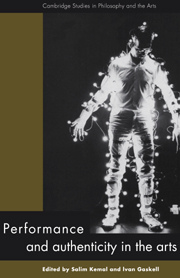Book contents
- Frontmatter
- Contents
- List of Contributors
- Editors' Acknowledgments
- 1 Performance and authenticity
- Part I Performance, religion, and authenticity
- Part II Understanding, performance, and authenticity
- 5 Understanding music
- 6 Understanding music
- 7 Musical performance as analytical communication
- 8 Performance authenticity possible, practical, virtuous
- 9 Why is it impossible in language to articulate the meaning of a work of music?
- Part III Authenticity, poetry, and performance
- Index
7 - Musical performance as analytical communication
Published online by Cambridge University Press: 12 November 2009
- Frontmatter
- Contents
- List of Contributors
- Editors' Acknowledgments
- 1 Performance and authenticity
- Part I Performance, religion, and authenticity
- Part II Understanding, performance, and authenticity
- 5 Understanding music
- 6 Understanding music
- 7 Musical performance as analytical communication
- 8 Performance authenticity possible, practical, virtuous
- 9 Why is it impossible in language to articulate the meaning of a work of music?
- Part III Authenticity, poetry, and performance
- Index
Summary
In my first year as a graduate student of music theory, I took a seminar on the relation between analysis and performance of classical music. The topic intrigued me; I had known of some writings on the subject, but I had not devoted sustained thought to the interaction of analysis and performance before. I was eager to understand the relations between two activities, each of which had already engaged me deeply.
The class meetings usually involved detailed analytical discussion of a piece, along with comments on the implications of the analysis for various performance decisions. The analyses covered a range of topics, but voice-leading, phrase structure, meter, and rhythm came up frequently. After the analytical discussion, there would be performance of some or all of the piece, typically by the teacher but sometimes by students. (Parts of the piece might be performed during the analytical discussion, also, but the most significant performances came after we reached analytical conclusions and derived some consequences for performance.) Performances led to further conversation, evaluating their success in responding to the analytical discussion.
I found the class exciting. Often, the performances seemed magically illuminating, and it was hard to doubt that analytical awareness contributed decisively to their clarity and intelligence. I praised the course highly to one of my undergraduate teachers, telling him that after such a course one simply did not hear music the same way.
- Type
- Chapter
- Information
- Performance and Authenticity in the Arts , pp. 129 - 153Publisher: Cambridge University PressPrint publication year: 1999
- 6
- Cited by

